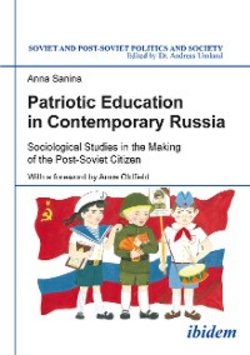Читать книгу Patriotic Education in Contemporary Russia - Aнна Санина - Страница 5
Acknowledgements
ОглавлениеTo be honest, I never planned to write a book about patriotic education. The idea of this study suddenly and discreetly sprang to my mind with the assistance of many people, to whom I am now very grateful and indebted.
It all started with my participation in the Fulbright Visiting Scholar Program, which gave me a fascinating opportunity not only to plunge into the true research environment of Indiana University, but also to travel, to meet many great scholars, and to finally see apparently familiar things from a different angle. I owe my deepest gratitude to Joel Ericson, Elena Shabashova, Cecilia Kocinski-Mulder, and many other people whom I do not know, for managing and coordinating this program and for supporting intercultural communication around the world. I am also grateful to my colleagues from the National Research University Higher School of Economics in Saint Petersburg, Alexander Khodachek, Valentina Kaysarova, Leonid Limonov, and Nadezhda Bebbukina, who supported my decision to participate in this program and made my being away smooth and communicatively lossless.
At Indiana University, I benefited from many candid and frank discussions with Sarah Phillips, Mark and Veronika Trotter, Svitlana Melnik, Miriam Shrager, Maria Shardakova, Roman Zlotin, and other members of the Russian and East European Institute. They not only generously shared their ideas and thoughts, but made me feel at home in the United States. I also want to thank Ashlyn Nelson for her great lectures on Public Program Evaluation that brought a significant governance-related perspective to my study.
I was honored to present the ideas of my research at George Washington University, Coastal Carolina University, and Harvard. I thank Marlène Laruelle, Tripthi Pillai, Stephanie Plant, and Nina Tumarkin for organizing and moderating my talks and for providing an encouraging environment for discussions. I am grateful to all faculty, researchers, and students who attended my lectures. Their comments and questions played a major role in shaping this study. I would like to thank Samantha Proulx and Ashley Canter, students of Coastal Carolina University, for their careful attention and genuine interest in Russian culture, society, and politics.
I extend my gratitude to helpful colleagues and good friends Regina Smyth, Darla Domke-Damonte, Rowenna Baldwin, Alyona Vandysheva, Vlada Baranova, Ivan Kovalyov, and Yanina Grusman, whose valuable ideas, clever recommendations, and relevant information really helped at different stages of initiating, developing, and revising this book. I owe my greatest thanks to Nina Tumarkin, Jussi Lassila, Anna Oldfield, Markku Kangaspuro, Marlène Laruelle, Sarah Phillips, Anatoli Rapoport, Ali Farazmand, Raffaele Gareri, Donata Delfino, and Eugenia Kutergina for critical readings of this manuscript, whether in part or in whole, and for making essential comments and suggestions.
I am grateful to my students, who were sometimes even more interested in this subject than I, for helping me in finding information and gathering and analyzing data: Daria Migunova, Daniil Zuev, Ksenia Lekomtseva, Nurlan Dzhafarli, Oleg Obidovskiy, and Anastasia Kozlova. I’d also like to thank Anna Polyanskaya, who patiently regarded my long explanations and finally painted an excellent picture for the cover of this book.
I am eternally grateful to all the respondents who gave their time, shared their experiences, and allowed me to access information I would never find even in the cleverest books. I am particular grateful to the teachers of Anninskaya school, who were not only the pioneer respondents in the pilot stage of this study, but also gave me a perfect education that in the long run led to this manuscript.
I finally have an opportunity to thank Saint Petersburg State University for bringing me to the wonderful cognitive world of investigations, questions, and puzzles. I am especially grateful to Ludmila Volchkova, Vera Minina, Elena Ostrowskaya, Dmitry Ivanov, and Sergey Damberg, talented teachers and passionate scientists who taught me to write and to think sociologically.
In the end, this book would not have been possible without the participation of Sarah Torbeck, who did a very careful and extensive job proofreading this text. I am grateful not only for her very professional work, but also for her emotional support and for cheering me up. That was very helpful.
I consider it an honor to work with Jakob Horstmann, Andreas Umland, and Valerie Lange from ibidem Press. I am grateful for their interest in the topic, for an offer to write a manuscript about patriotic education, and for an excellent collaboration.
My greatest debt incurred in writing this book, as well as all my love, is to my family. They patiently supported me during the intensive, nervous, and significantly underestimated time of contacting, interviewing, writing, and revising the text. My spouse Alexey served in multiple roles as a proponent, a critic, a collaborator, a sounding board, and a shoulder to cry on. I am also grateful to you, Masha, for coming into my life and giving significant meaning to everything I do... but in particular, for those (few) nights that you finally slept, giving your Mommy a chance to write some more pages and to finally drink her morning coffee.
I want to thank my amazing parents Zoya and Georgiy, first of all, for making me a teacher's child who probably unconsciously understood the spirit of the Russian educational system and the nature of teachers’ habitus even before going to the nursery. They formed a significant part of my vision and taught me the value of hard work. Without the support and encouragement they have given me throughout my life, I would never have gotten to where I am today.
